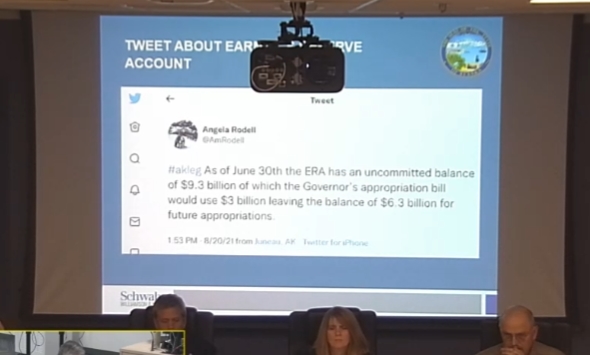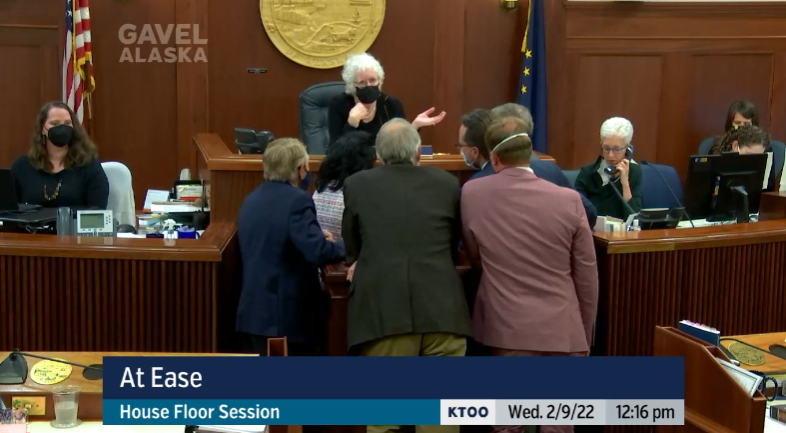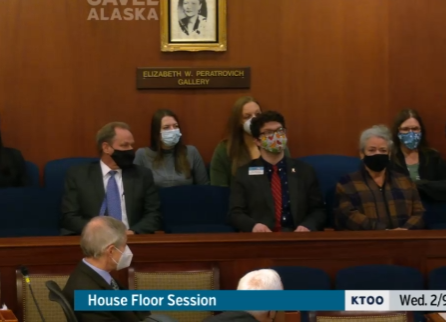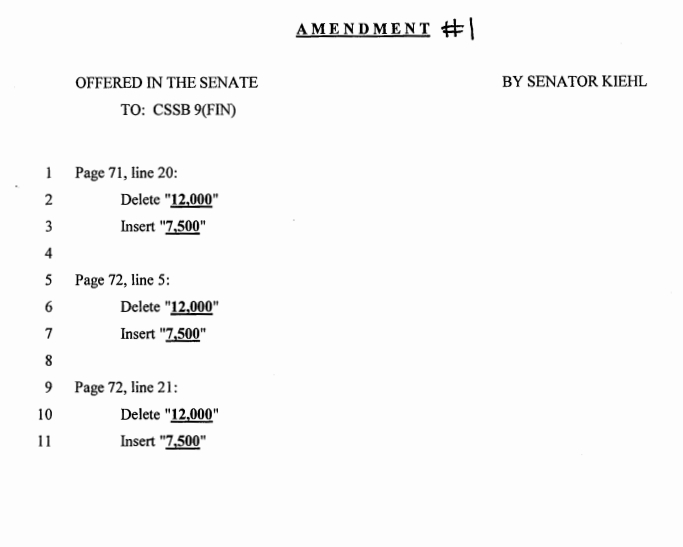
It's #akleg day, baby! The Legislative Budget and Audit Committee is underway with a hearing on the results of the investigation into the abrupt firing of Alaska Permanent Fund Corporation CEO Angela Rodell last year.
📺: w3.akleg.gov/includes/_play…
📺: w3.akleg.gov/includes/_play…

As @ak_ok pointed out, the Alaska Permanent Fund Corporation ran its own counter investigation into the investigation that says it's all fine BUT it does note efforts by individuals in Gov. Dunleavy's office to rein in Rodell's social media use.
https://twitter.com/AK_OK/status/1575216216641503232
Sen. von Imhof, leading off on the firing of Rodell and the importance of the permanent fund's place in the state budget: "It's imperative that the fund is protected from political intervention or manipulation."
#akleg
#akleg
The agenda moving forward:
We're getting a 30-minute presentation from the investigators with follow ups for questions and further power points. There's no plan for legislators to go into executive session (closed doors).
von Imhof: "I'm anticipating this will take 3 hours."
We're getting a 30-minute presentation from the investigators with follow ups for questions and further power points. There's no plan for legislators to go into executive session (closed doors).
von Imhof: "I'm anticipating this will take 3 hours."
The investigator Howard Tricky leading off on the investigation's mission: "Our charge was to find out what the facts were and to report to you the facts. ... Facts are not alternative. Facts are like simple math, two plus two equals four."
#akleg
#akleg
Tricky says they had 3 main conclusions:
- The trustees who fired lost faith in Rodell, for different reasons
- The board failed to follow its own charter on performance evaluations
- No explicit connections between the trustees and Gov. Dunleavy on the firing of Rodell
#akleg
- The trustees who fired lost faith in Rodell, for different reasons
- The board failed to follow its own charter on performance evaluations
- No explicit connections between the trustees and Gov. Dunleavy on the firing of Rodell
#akleg
Basically put, no explicit evidence that Gov. Dunleavy's office directed the Board of Trustees to abruptly fire Rodell in a confusing and messy process. The Board of Trustees created that confusing and messy process all on their own, apparently.
Now we're getting into the performance evaluation by the Alaska Permanent Fund Corporation. Investigator Slottee says the process did not "result in clear and specific goals for the director" and that she "received little guidance" and "inconsistent feedback."
#akleg
#akleg
Slottee says in the performance evaluations criticized Rodell for trying to manipulate the board to pursue her own political agenda (which was to protect the fund from overspending) but when asked in depositions, the trustees couldn't actually name anything specific.
Slottee says only Richards actually had anything close to specifics but says that it was mostly just inferences into her actions and nothing particularly concrete.
Slottee goes onto talk about how Trustee Mahoney (Revenue Commission) ran a 360-performance survey of Rodell without involvement of the contractor who designed it. She also sent it out to everyone regardless of whether they had the relevant knowledge.
Slottee says the review led by Trustee/Commissioner Mahoney did not follow the charter and did not follow standard human resources procedures.
He says her report was "deficient" and emphasized the negative comments against Rodell despite the overall review being an improvement.
He says her report was "deficient" and emphasized the negative comments against Rodell despite the overall review being an improvement.
Slottee says the Board of Trustees, in their reasons for firing Rodell, were concerned they feared the fund would lose top investment talent if she stayed on.
He says there's no real evidence that their concerns were valid.
He says there's no real evidence that their concerns were valid.
Slottee says, though, "lack of confidence" is a sufficient and legal reason to fire someone, even if the reasons for their lack of confidence isn't based on evidence.
Rep. Josephson asks, basically, if the trustees cannot actually explain why they lost trust in someone is that lack of trust actually a legal basis for firing someone?
Slottee and Tricky say, basically, yes. It's subjective.
Slottee and Tricky say, basically, yes. It's subjective.
(Rodell has said she's considering a lawsuit against the state over her firing.)
Slottee notes the survey process did not follow the charter. "Following the charter, we think, would have resulted in a more accurate and complete assessment of the director's performance."
Tricky notes it would have been easier to verify, too.
Tricky notes it would have been easier to verify, too.
They both note that some of the board didn't even really use the performance evaluation (which in the aggregate showed improved performance for evaluation) when they decided to fire her, instead relying on their personal interactions.
Tricky and Slottee both note that the reviews from the investment staff at APFC was lower than other areas and the trustees took that to fear that Rodell's continued employment would drive away staff.
Then in July of this year: newsminer.com/news/politics/…
Then in July of this year: newsminer.com/news/politics/…

Sen. von Imhof notes that only four of the six trustees actually completed the performance evaluation of Rodell:
"I find that very curious."
#akleg
"I find that very curious."
#akleg
Sen. Reinbold: "What it looks like to me is there was no true objectivity regarding the removal of her and it ended up leaning to more subjective activity."
Reinbold goes on to note that she can't stay for the whole meeting because she has unexpected issues with her court cases.
"I have to head to court."
"I have to head to court."
Now going over the individual trustees' reasoning for firing Rodell.
Schutt thought Rodell was the one getting political when she raised concerns about what a shutdown would have on the fund. Said it was too mean to Gov. Dunleavy.
Schutt thought Rodell was the one getting political when she raised concerns about what a shutdown would have on the fund. Said it was too mean to Gov. Dunleavy.
According to the investigation, Mahoney also didn't like that Rodell talked back against the board when Rodell questioned whether the board wanted to stay politically independent.
According to the investigation, Feige also said Rodell's news release on the shutdown was "wildly irresponsible."
According to the investigation, Richards conceded that he always wanted to fire Rodell.
According to the investigation, Reagor thought Rodell was doing fine but supported firing her anyways.
According to the investigation, Moran was confident in Rodell's performance and supported her work. He was the only one who voted against the firing but believed the other trustees had the right to fire her if they wanted.
The Alaska Permanent Fund Corporation's Board of Trustees reasons for firing Rodell, summed up: She was mean when Gov. Dunleavy nearly shut down the state and we didn't like that.
Slottee says the trustees all denied under oath that they didn't give Gov. Dunleavy advanced knowledge of the firing of Rodell.
Rep. Josephson references the APFC's investigation into the investigation. He asks whether Slottee believes the testimony was credible.
Slottee says, well, it was given under oath.
Slottee says, well, it was given under oath.
Rep. Josephson: "It's a matter of fact that the administration would welcome an overdraw and would still welcome an overdraw."
The reports and presentations will all be posted around 5 p.m., btw. Just watching the stream now.
Slottee goes onto note that Richards had several conversations with Gov. Dunleavy, indicating that firing her was an option. According to Richard's testimony, Dunleavy said that the decision was ultimately theirs and just to make sure if they did it, to make it legal.
Slottee notes that the executive director position is inherently political because of its pressures for the budget and PFD: "When the ED tried to navigate these political waters, the trustees ultimately held it against her.
Tuck on the Board of Trustees' failure to follow the charter's directive on performance evaluations: ""You're putting a person between a rock and a hard place. It's almost like setting bear traps out for somebody."
He says, basically, it's a way to introduce mistakes.
He says, basically, it's a way to introduce mistakes.
Tuck says the whole thing appears to be driven by personality differences. He says those kinds of actions undermine the fund.
"I wish they had followed the charter a little bit more."
"I wish they had followed the charter a little bit more."
Sen. von Imhof asks whether the evaluation prepared by Mahoney was fair and fairly influenced the decisions.
Slottee says they all took the survey differently but none had the training or knowledge to see the errors in the evaluation's creation.
Slottee says they all took the survey differently but none had the training or knowledge to see the errors in the evaluation's creation.
And now we're getting into a more focused talk about the performance evaluation. Legislators are zeroing in in on what they (and investigators) see as a biased report produced by Mahoney.
The meeting summed up: No evidence of Dunleavy's direct involvement of the firing of Rodell, but skewed performance evaluations conducted by Dunleavy appointee Mahoney and misgivings over public statements they believed were overly critical of Dunleavy played a role.
#akleg
#akleg
Slottee on the evaluation process outlined in the charter that was not followed in the firing of Alaska Permanent Fund CEO Rodell: "The process is a good process and should have been followed. ... (What they did) did not produce a complete or fair evaluation."
#akleg
#akleg
Rep. Spohnholz asks, then, what's the point of it if they don't actually have to follow it.
Slottee says they should follow it.
Spohnholz: Is it illegal not to follow it?
Slottee: No. It's not good process, but it's not illegal.
Slottee says they should follow it.
Spohnholz: Is it illegal not to follow it?
Slottee: No. It's not good process, but it's not illegal.
Slottee: "They did not follow the policy, did not adopt any formal amendment to the policy."
But says that their actions of not following the policy, is basically like changing the policy.
"It's not good corporate governance."
But says that their actions of not following the policy, is basically like changing the policy.
"It's not good corporate governance."
Tricky: "There was a big disconnect between what the executive director thought what the board expected of her and what the board was in fact expecting of her."
Tricky says Rodell thought that her job was to ensure the fund grew happily, but the Board of Trustees believed she played no role in the fund's performance.
Rep. Josephson notes that at-will employees have been able to successfully sue for improper termination.
Tricky: Yep.
Josephson wonders whether a jury would consider the biased performance evaluation.
Tricky says, sure, but they were also relying on personal interactions.
Tricky: Yep.
Josephson wonders whether a jury would consider the biased performance evaluation.
Tricky says, sure, but they were also relying on personal interactions.
Tricky says those concerns may have been misplaced but were not explicitly false. They can simply just not like someone and it's a valid reason for firing them.
Tricky says they all had "lack of confidence" as a reason for her firing but reached the point from different places.
To be clear, it seems like a lot of those different directions were when she was critical of the potential state shutdown's impact and a tweet.
To be clear, it seems like a lot of those different directions were when she was critical of the potential state shutdown's impact and a tweet.
Now we're getting into the Terrible, Horrible, No Good, Very Bad Press Release that warned a shutdown might hurt the fund.
The firing trustees thought it was too involved in the fight between the legislature and governor.
Moran, who didn't vote to fire, thought it was fine.
The firing trustees thought it was too involved in the fight between the legislature and governor.
Moran, who didn't vote to fire, thought it was fine.
Trustee Fiege was particularly incensed by the news release, said it was "wildly inappropriate" and "absolutely out of bounds" and she was furious about it.
Then there was the Terrible, Horrible, No Good, Very Bad Tweet.
Richards was mad about it, saying the tweet was a "backhanded critique" of the governor.
Tuck says it looks like a statement of the facts. Slottee says the #akgov office was mad that she was tweeting at all.
Richards was mad about it, saying the tweet was a "backhanded critique" of the governor.
Tuck says it looks like a statement of the facts. Slottee says the #akgov office was mad that she was tweeting at all.

Slottee on the Tweet: "No one testified that the numbers were inaccurate."
Tuck: "Then the Board of Trustees needs to come up with a policy that the ED can't tweet. ... I don't know how anyone can be offended when she's just stating the facts."
#akleg
Tuck: "Then the Board of Trustees needs to come up with a policy that the ED can't tweet. ... I don't know how anyone can be offended when she's just stating the facts."
#akleg
Hey! It turns out the tweets of @scooterkendall aren't the only ones that makes the Dunleavy administration throw a fit.
I guess I missed the announcement of the Office of Twitter Police being formed in the Dunleavy office.
And then there was the Terrible, Horrible, No Good, Very Bad Mediator that Rodell attempted to bring on to discuss the strategic plan with the Board of Trustees.
Trustee Fiege called it a "bright-line event" that influenced her decision to fire Rodell, calling it embarrassing.
Trustee Fiege called it a "bright-line event" that influenced her decision to fire Rodell, calling it embarrassing.
Honestly, guys, Twitter is stupid but an administration that spends so much time getting worked up over tweets—going as far as printing out tweets of their enemies in regular reports—is just silly.
The Board of Trustees were apparently very upset about the Terrible, Horrible, No Good, Very Bad September 2021 board meeting in September.
Investigators say beyond the facilitator, they didn't see any actual "attack" on the Board of Trustees that has been alleged.
Investigators say beyond the facilitator, they didn't see any actual "attack" on the Board of Trustees that has been alleged.
Another complaint raised by Trustee Richards was Rodell's position that opening a second Permanent Fund office in Anchorage was a bad idea and a waste of money.
She said it'd be a better idea to open an office near their investments.
Richards accused her of inflating the costs.
She said it'd be a better idea to open an office near their investments.
Richards accused her of inflating the costs.
Slottee says no one else echoed Richard's accusation about inflating real estate costs.
von Imhof also notes that the board could have gone ahead and hired its own real estate team if they didn't trust her. (They didn't)
von Imhof also notes that the board could have gone ahead and hired its own real estate team if they didn't trust her. (They didn't)
Slottee says the trustees couldn't really name anything specific or actually problematic between the board of Trustees and Rodell.
Said, though, that the tension was real nonetheless. Even if unfounded, the tension is still tension that can justify a firing.
Said, though, that the tension was real nonetheless. Even if unfounded, the tension is still tension that can justify a firing.
von Imhof: "Is this a problem? That people can make a verbal assertion and then can't back it up? Or can you do that all day long?"
Slottee says the charter policy is there in order to remove the personal politics from it. They didn't follow it.
Slottee says the charter policy is there in order to remove the personal politics from it. They didn't follow it.
Slottee says the way the board approached it: "That's generally not the best way to manage a CEO."
But he says that, still, not liking someone is still a legal reason for firing someone. Not a good reason, but a legal reason.
But he says that, still, not liking someone is still a legal reason for firing someone. Not a good reason, but a legal reason.
Bishop asks whether the board has learned anything from this and will treat CEOs better in the future: "Are we going to continue to be subjective with our terminations?"
Tricky says they asked them if they would do anything differently and they all said no.
Tricky says they asked them if they would do anything differently and they all said no.
They're taking a quick break.
Going back over the tape to get some quotes.
Few interesting tidbits on the Dunleavy administration's ire over The Tweet.
Few interesting tidbits on the Dunleavy administration's ire over The Tweet.
A member of Dunleavy's office reached out directly to Mahoney to express their "displeasure" with The Tweet. Mahoney turned around and told Rodell "to be mindful" about it.
Rodell said it was more like telling her to "watch her back." She offered to resign over it.
Rodell said it was more like telling her to "watch her back." She offered to resign over it.
Sen. von Imhof: "It does seem that there's slightly a bit of excessive ire placed on pretty benign documents and a tweet. I just am curious whether the board was trying to find a place to hang their hat, and this is all they can come up with."
Back at it.
Rep. Spohnholz goes over a meeting where Trustee Mahoney wanted to cut a bunch of staff/new staff because the PFD wasn't as big as Dunleavy wanted.
The motion was defeated but it produced a statement from Rodell about whether APFC wanted to maintain independence.
Rep. Spohnholz goes over a meeting where Trustee Mahoney wanted to cut a bunch of staff/new staff because the PFD wasn't as big as Dunleavy wanted.
The motion was defeated but it produced a statement from Rodell about whether APFC wanted to maintain independence.
Here's the background on that story: ktoo.org/2021/10/03/per…
This, probably more than anything else, was likely the beginning of the end for Rodell. Seems like she was hitting a little too close to home for the board: 

Slottee says the Dunelavy agenda (bigger PFDs and overdraws on the Permanent Fund) were not directly raised during the closed-door discussion on firing Rodell, according to their sworn testimony.
Tricky notes that there's no way to verify those claims.
Tricky notes that there's no way to verify those claims.
Rep. Josephson on the article linked above: "The author Andrew Kitchenman who I think is a well-trusted journalist."
Rep. Josephson notes that the article, where Rodell was arguing in favor of performance-based bonuses over Mahoney's objections. Says it sure seems to counter this narrative that Rodell was driving away investment staff and was, in fact, trying to retain them.
While a lot of this seems to undermine the complaints raised by the Board of Trustees, it probably doesn't matter much when they settled on "We don't like or trust her anymore."
By the law, it seems like they don't have to really explain why they don't trust her.
By the law, it seems like they don't have to really explain why they don't trust her.
Richards was mad that Trustee Moran raised concerns about Commissioner Mahoney's unprecedented (right?) appointment as vice chair of the board.
Richards claimed Moran was being manipulated by Rodell to raise concerns that Mahoney would be manipulated by Dunleavy (her boss).
Richards claimed Moran was being manipulated by Rodell to raise concerns that Mahoney would be manipulated by Dunleavy (her boss).
Rep. Josephson: It's crying out for reform.
Says it doesn't make sense to have a commissioner also serve as a trustee/vice chair when she has clearly conflicting interests (big PFD vs. future of the permanent fund's health).
He says there needs to be changes.
Says it doesn't make sense to have a commissioner also serve as a trustee/vice chair when she has clearly conflicting interests (big PFD vs. future of the permanent fund's health).
He says there needs to be changes.
Into wrap up now. Here's the main conclusions:
-The board failed to follow its charter in all material respects
-The trustees lost confidence
-No direct evidence or credible circumstantial evidence that Dunleavy ordered Rodell be fired (though he was aware they wanted her gone)
-The board failed to follow its charter in all material respects
-The trustees lost confidence
-No direct evidence or credible circumstantial evidence that Dunleavy ordered Rodell be fired (though he was aware they wanted her gone)

Slottee says that the executive director position would be better served if the Board of Trustees gave her clear performance metrics rather than the ad hoc and subjective method they used to fire her.
Rep. Foster, in closing comments: "Where do we go from here? ... How do we instill some confidence that this won't happen again in the future."
Rep. Josephson, in closing, likens the whole thing to a bad marriage but says that he doesn't agree with the investigators' conclusion that the firing was legal and fine.
He says it sure looks like she's got a case against the state.
He says it sure looks like she's got a case against the state.
Josephson, continued: "I'm worried they've become infected with politics."
He says some of the Trustees and Dunleavy were clearly eager in breaking the spending limit on the Alaska Permanent Fund.
"Ms. Rodell was not an acolyte in that way of thinking."
He says some of the Trustees and Dunleavy were clearly eager in breaking the spending limit on the Alaska Permanent Fund.
"Ms. Rodell was not an acolyte in that way of thinking."
Josephson closes with a call for legislation that will rework the membership of the Board of Trustees. Says the politics need to be removed from the oversight of the board.
Rep. Spohnholz says despite no clear evidence that Dunleavy called the shot, it's impossible to overlook the fact that Mahoney and Feige "have two masters" and one of them, Dunleavy, is signing their checks.
Rep. Spohnholz is also critical of the board's failure to communicate clear goals to Rodell. She says Rodell was under the impression that the fund's health was of utmost importance, but it appears the Trustees saw the fund's performance outside her duties or credit.
Tuck says the takeaway from the report is that if you want to fire an at-will employee of any level, the best way to do it is just say you lack confidence in them or want a new direction because it doesn't look like you have to back it up with anything meaningful.
Sen. von Imhof, in closing, says the Board of Trustees needs to do a better job at remaining professional and contemplative rather than "impulsive and hasty."
Sen. von Imhof suggests that the performance review of Permanent Fund leadership should come before the LB&A committee moving forward. She says the public, as the ultimate stakeholders in the fund, deserve it.
"Where's the oversight. Let's stop the sloppiness."
"Where's the oversight. Let's stop the sloppiness."
Sen. von Imhof suggests changes to the board:
-Expand to seven seats, with five-year terms
-All future seats be confirmed by the Legislature
-Have two out-of-state members
-Governor only gets one direct pick from his admin
-Vice chair cannot be gov employee
-Expand to seven seats, with five-year terms
-All future seats be confirmed by the Legislature
-Have two out-of-state members
-Governor only gets one direct pick from his admin
-Vice chair cannot be gov employee
And that's it for the meeting.
Documents and the investigation look like they've been posted: akleg.gov/basis/Meeting/…
Documents and the investigation look like they've been posted: akleg.gov/basis/Meeting/…
@threadreaderapp unroll
• • •
Missing some Tweet in this thread? You can try to
force a refresh














